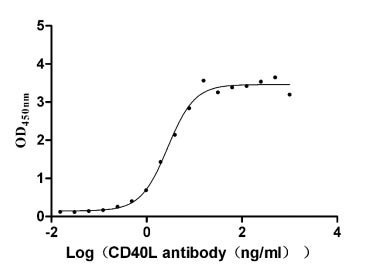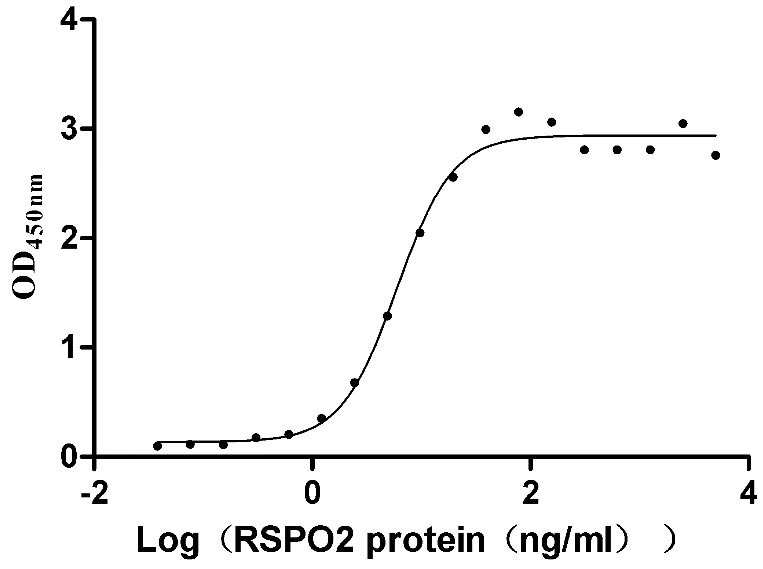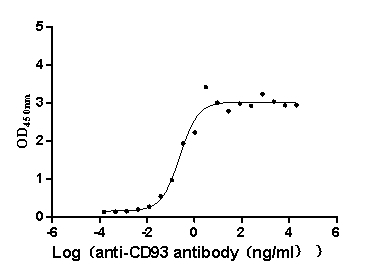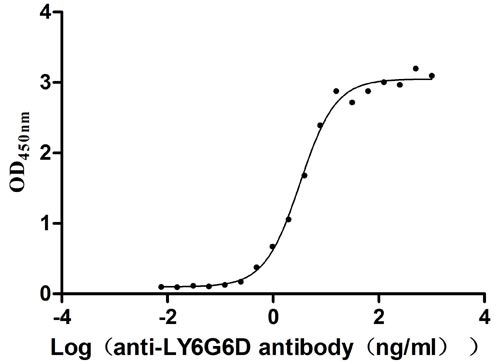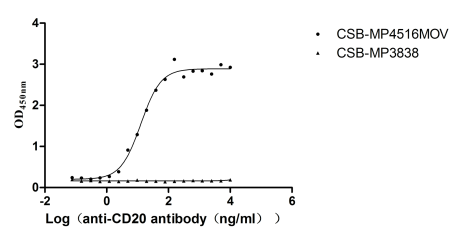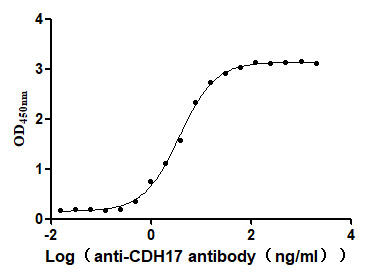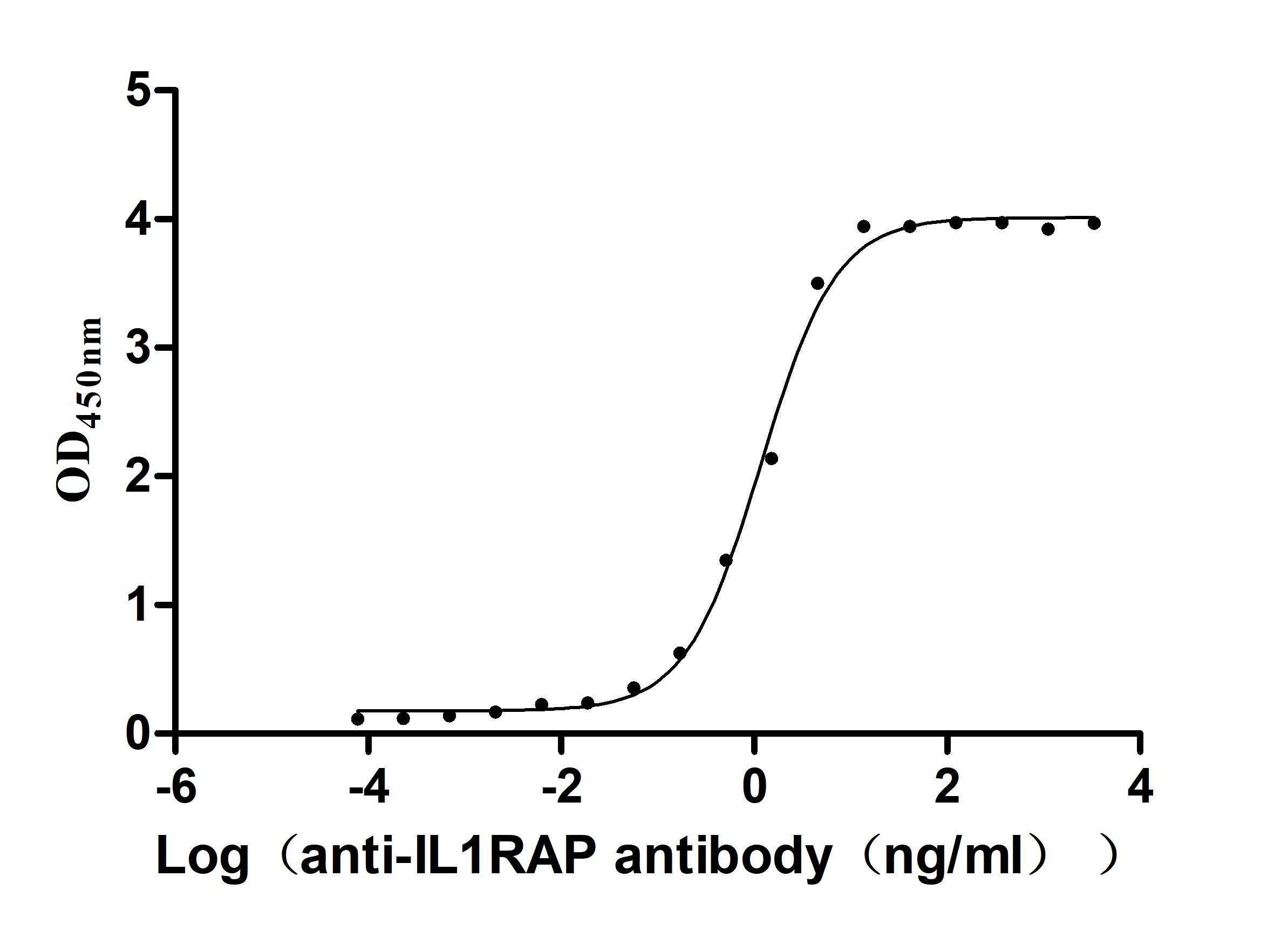Recombinant Rat Myc proto-oncogene protein (Myc)
-
货号:CSB-YP015270RA
-
规格:
-
来源:Yeast
-
其他:
-
货号:CSB-EP015270RA
-
规格:
-
来源:E.coli
-
其他:
-
货号:CSB-EP015270RA-B
-
规格:
-
来源:E.coli
-
共轭:Avi-tag Biotinylated
E. coli biotin ligase (BirA) is highly specific in covalently attaching biotin to the 15 amino acid AviTag peptide. This recombinant protein was biotinylated in vivo by AviTag-BirA technology, which method is BriA catalyzes amide linkage between the biotin and the specific lysine of the AviTag.
-
其他:
-
货号:CSB-BP015270RA
-
规格:
-
来源:Baculovirus
-
其他:
-
货号:CSB-MP015270RA
-
规格:
-
来源:Mammalian cell
-
其他:
产品详情
-
纯度:>85% (SDS-PAGE)
-
基因名:
-
Uniprot No.:
-
别名:Myc; Myc proto-oncogene protein; Proto-oncogene c-Myc; Transcription factor p64
-
种属:Rattus norvegicus (Rat)
-
蛋白长度:Full length protein
-
表达区域:1-439
-
氨基酸序列MPLNVSFANR NYDLDYDSVQ PYFICDEEEN FYHQQQQSEL QPPAPSEDIW KKFELLPTPP LSPSRRSGLC SPSYVAVATS FSPREDDDGG GGNFSTADQL EMMTELLGGD MVNQSFICDP DDETFIKNII IQDCMWSGFS AAAKLVSEKL ASYQAARKDS TSLSPARGHS VCSTSSLYLQ DLTAAASECI DPSVVFPYPL NDSSSPKSCT SSDSTAFSSS SDSLLSSESS PRATPEPLVL HEETPPTTSS DSEEEQDDEE EIDVVSVEKR QPPAKRSESG SSPSRGHSKP PHSPLVLKRC HVSTHQHNYA APPSTRKDYP AAKRAKLDSG RVLKQISNNR KCSSPRSSDT EENDKRRTHN VLERQRRNEL KRSFFALRDQ IPELENNEKA PKVVILKKAT AYILSVQADE HKLISEKDLL RKRREQLKHK LEQLRNSGA
-
蛋白标签:Tag type will be determined during the manufacturing process.
The tag type will be determined during production process. If you have specified tag type, please tell us and we will develop the specified tag preferentially. -
产品提供形式:Lyophilized powder
Note: We will preferentially ship the format that we have in stock, however, if you have any special requirement for the format, please remark your requirement when placing the order, we will prepare according to your demand. -
复溶:We recommend that this vial be briefly centrifuged prior to opening to bring the contents to the bottom. Please reconstitute protein in deionized sterile water to a concentration of 0.1-1.0 mg/mL.We recommend to add 5-50% of glycerol (final concentration) and aliquot for long-term storage at -20℃/-80℃. Our default final concentration of glycerol is 50%. Customers could use it as reference.
-
储存条件:Store at -20°C/-80°C upon receipt, aliquoting is necessary for mutiple use. Avoid repeated freeze-thaw cycles.
-
保质期:The shelf life is related to many factors, storage state, buffer ingredients, storage temperature and the stability of the protein itself.
Generally, the shelf life of liquid form is 6 months at -20°C/-80°C. The shelf life of lyophilized form is 12 months at -20°C/-80°C. -
货期:Delivery time may differ from different purchasing way or location, please kindly consult your local distributors for specific delivery time.Note: All of our proteins are default shipped with normal blue ice packs, if you request to ship with dry ice, please communicate with us in advance and extra fees will be charged.
-
注意事项:Repeated freezing and thawing is not recommended. Store working aliquots at 4°C for up to one week.
-
Datasheet :Please contact us to get it.
靶点详情
-
功能:Transcription factor that binds DNA in a non-specific manner, yet also specifically recognizes the core sequence 5'-CAC[GA]TG-3'. Activates the transcription of growth-related genes. Binds to the VEGFA promoter, promoting VEGFA production and subsequent sprouting angiogenesis. Regulator of somatic reprogramming, controls self-renewal of embryonic stem cells. Functions with TAF6L to activate target gene expression through RNA polymerase II pause release.
-
基因功能参考文献:
- High c-myc expression is associated with liver fibrosis. PMID: 30243650
- C-myc gene silencing can promote cell proliferation and inhibit cell apoptosis and cytokine expression in IL-1beta-induced rat chondrocytes. PMID: 28616752
- demonstrated that RSV activated klf5 phosphorylation by inhibiting PI3K/PKD1/Akt pathway, and then attenuated the interaction of klf5 with c-Myc PMID: 29211809
- Dibutyl phthalate caused an increase in mRNA levels of c-Myc in the liver at all time points. DBP exerted biological activity through epigenetic modulation of c-Myc gene expression, it seems possible that dibutyl phthalate induced active demethylation of c-Myc gene through mechanism(s) linked to generation of reactive oxygen species by activated c-Myc. PMID: 24311629
- loss of inhibition on c-myc-Bmi-1-p16 signaling pathway by let-7g may lead to PASMCs proliferation and vascular remodeling in pulmonary hypertension PMID: 27889560
- JNK1 mediates pancreatic beta apoptotic cell death associated with increased Myc expression in IL1-beta treated cells. PMID: 26962537
- By inducing Myc expression in the colonic epithelium, lithium promotes colonic regeneration after DSS-induced colitis. PMID: 26320084
- Glucagon phosphorylates serine 552 of beta-catenin leading to increased expression of Ccnd1 and c-Myc in the isolated rat liver. PMID: 26135564
- Myc is critical in modulating the amplitude of cell cycle, whereas cyclin D/E activities have little effect on amplitude but do contribute to the modulation of duration of E2F1 activation, thereby affecting the pace of cell cycle progression. PMID: 25175461
- Activation of the ERK1/2 signalling pathway, increased phosphorylation of c-myc and significantly increased expression of cyclin D2 protein, are demonstrated. PMID: 25450615
- The study demonstrates the role of c-Myc as a central metabolic regulator and Bcl-2 and Akt assisting in extending c-Myc half-life as well as in regulation of autophagy, so as to regulate cell survival on the whole. PMID: 25056450
- Data indicate that c-Myc knockout cells preferentially utilize fatty acids as energy-generating substrates and reprogram other pathways to maximize acetyl-CoA and ATP production. PMID: 25053415
- Nol5a expands the link between Myc-induced regulation of nucleolar target genes PMID: 24013231
- Upregulation of Myc expression is associated with N-methyl nitrosourea induced rat mammary tumours. PMID: 24083763
- Bromodichloromethane decreases E-cadherin mRNA and increases that of c-myc and cyclin D1 in kidneys. PMID: 24001804
- Semiquantitative immunohistochemical analyses of Klf4, Sox2, c-Myc and Oct4 were studied in testes paraffin sections via light microscopy. PMID: 23828673
- the induction of ATF4/CHOP expression occurs via mTORC1 regulation of c-MYC and that this signaling pathway is a major determinant in the ability of bortezomib to induce apoptosis. PMID: 23612979
- Nanog and Klf4 antagonistically regulate c-Myc, and hence, cell hypoxia survival and cell cycle activation in experimental hepatoma. PMID: 23287475
- Cadmium may contribute to carcinogenesis by activating telomerase, and overexpressing the mRNAs of TERT, c-myc and p53, and causing apoptosis of normal hepatocytes. PMID: 21181359
- Overexpression of c-myc is associated with Acinar-to-ductal metaplasia in exocrine pancreatic cancer progression. PMID: 22024988
- Results suggest that c-myc is an important factor that promotes the proliferation of nucleus pulposus cells PMID: 21678465
- Results identified rapid-response genes likely to be direct c-Myc targets, and analyzed the promoters of the repressed genes to identify transcription factors that could be targets of c-Myc repression. PMID: 21623162
- Modest overexpression of cMyc is able to drive proliferation without cell death in normal rat and human beta-cells. PMID: 21885567
- PCB causes changes in the phenotype of the testis tissue, and the abnormal expressions of c-fos, c-Myc and beta-catenin are closely related to the PCB-induced testis injury. PMID: 21404708
- The activation and recruitment of ChREBP to several glucose-responsive genes were blocked by 1RH, indicating a general necessity for c-Myc in this process. PMID: 20382893
- The modulation of c-myc expression in testicles of rats treated with CS2 could be associated with lipid peroxidation induced by CS2. PMID: 17953200
- N-nitroso-N-methylurea disrupted and dietary methylselenocysteine significantly increased the expression of c-myc in mammary glands of Fischer 344 rats PMID: 20424134
- Huoxue Qianyang can inhibit the expression of c-myc in ventricular hypertrophy tissue. PMID: 18405607
- Positive expression of c-myc protein in some neurons was seen at 20 min after brain concussion. PMID: 17190142
- data demonstrate that MYC contributes to the activation of the ATM-dependent checkpoint responses, leading to cell death in response to specific genotoxic stimuli PMID: 20111719
- Data show that Myc repressed Ras-induced senescence, and that Cdk2 interacted with Myc at promoters, where it affected Myc-dependent regulation of genes, including those of proteins known to control senescence. PMID: 19966300
- Data demonstrate that polyamines regulate c-Myc translation in IECs through HuR phosphorylation by Chk2 and provide new insight into the molecular functions of cellular polyamines. PMID: 19812253
- Modulation of c-myc and c-fos gene expression in regenerating rat liver by 2-mercaptopropionylglycine PMID: 11846448
- expression in the brain during the first 3 weeks postexposure to impulse noise of 198 or 202 dB PMID: 11939505
- observations establish p27 as a physiologically relevant regulator of cyclin D-Cdk4/6 activity as well as mechanistically a target of c-Myc action PMID: 12070150
- Expression analysis and chromatin immunoprecipitation demonstrated that mitochondrial serine hydroxymethyltransferase is a direct Myc target gene, establishing a novel functional link between Myc and the regulation of cellular metabolism PMID: 12138190
- Transfected rat c-Myc functionally cooperates with Bax to induce apoptosis in mouse embryo fibroblasts. PMID: 12167710
- Augments the apoptotic activity of cytosolic death receptor signaling proteins by engaging the mitochondrial apoptotic pathway. PMID: 12202489
- This gene is required for the glucose-mediated induction of metabolic enzyme genes. PMID: 12480946
- c-Myc binds to TFIIIB, a pol III-specific general transcription factor, and directly activates pol III transcription PMID: 12529648
- c-myc expression leads to mitochondrial dysfunction and apoptosis by deregulating genes involved in mitochondrial function. PMID: 12533512
- Results suggest that c-Myc directly affects cell growth (accumulation of mass) and cell proliferation (the cell cycle machinery) by independent pathways. PMID: 12631706
- MYC recruits the TIP60 histone acetyltransferase complex to chromatin PMID: 12776177
- prolonged culture at low glucose partly results from early and sustained induction of beta-cell c-myc expression PMID: 14651961
- a model in which doxorubicin simultaneously triggers multiple c-Myc-dependent apoptosis pathways. PMID: 14990581
- c-myc transactivates rat and human adrenomedullin genes and accelerates the degradation rate of adrenomedullin mRNA PMID: 15192039
- a new mechanism by which Myc can silence gene expression not only by passive functional interference but also by active recruitment of corepressor proteins PMID: 15616584
- study of the nucleolar localization of hepatic c-Myc PMID: 15777849
- genetic analysis of the cascade of c-myc-activated genes PMID: 15867157
- The tumor-like proliferation of synoviocytes from AA rat joint might be related to the increased mRNAs of C-myc and ODC genes. PMID: 15989779
显示更多
收起更多
-
亚细胞定位:Nucleus, nucleoplasm. Nucleus, nucleolus.
-
数据库链接:
KEGG: rno:24577
STRING: 10116.ENSRNOP00000006188
UniGene: Rn.12072
Most popular with customers
-
Recombinant Human CD40 ligand (CD40LG), partial (Active)
Express system: Mammalian cell
Species: Homo sapiens (Human)
-
Recombinant Human E3 ubiquitin-protein ligase ZNRF3 (ZNRF3), partial (Active)
Express system: Mammalian cell
Species: Homo sapiens (Human)
-
Recombinant Macaca fascicularis CD93 molecule (CD93), partial (Active)
Express system: Mammalian cell
Species: Macaca fascicularis (Crab-eating macaque) (Cynomolgus monkey)
-
Recombinant Human Lymphocyte antigen 6 complex locus protein G6d (LY6G6D) (Active)
Express system: Yeast
Species: Homo sapiens (Human)
-
Recombinant Macaca fascicularis Membrane spanning 4-domains A1 (MS4A1)-VLPs (Active)
Express system: Mammalian cell
Species: Macaca fascicularis (Crab-eating macaque) (Cynomolgus monkey)
-
Recombinant Human Cadherin-17 (CDH17), partial (Active)
Express system: Mammalian cell
Species: Homo sapiens (Human)
-
Recombinant Human Interleukin-1 receptor accessory protein (IL1RAP), partial (Active)
Express system: Mammalian cell
Species: Homo sapiens (Human)


